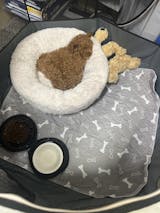First Time Dog Parents: Prepare for the Common Dog Diseases
It's beautiful to have a new puppy in your family! We understand that this is an exciting moment for you and your family. Our goal isn't to stifle the excitement. However, we simply want you to be ready for the worst-case scenario. As a follow-up to previous articles on how to get prepared for new puppies, we'd like to share some information about common canine ailments.
In many cases, they cannot tell us if their stomach hurts or what aches, so they suffer in silence. As pet owners, we strive to provide the best possible care for our dogs, but it can be difficult when they can't communicate with us.
This blog provides information on potential health issues and associated risk factors so that you can avoid them.
Signs of Most Common Health Problems in Dogs
As with humans, a dog's health deteriorates as it ages. Our pets, on the other hand, age far more quickly than we do. It doesn't matter how old your dog is; you can still make a difference in her health and well-being. Remember that while your dog won't be able to convey symptoms to you, she will be able to show you indicators of disease.

It is possible to lessen your pet's chance of contracting the most prevalent diseases by being familiar with their symptoms. Unfortunately, at least 10% of pets examined annually by their veterinarians and their owners and appear healthy have underlying ailments is a little alarming.
- Drooling or bad breath.
- Drinking or urinating excessively.
- Modification of one's appetite as a result of weight reduction or growth.
- Activity levels have changed.
- Inability to ascend and descend the stairs with ease.
- Oversleeping or other alterations in behaviour or attitude.
- There may be some sneezing or coughing as well as increased panting or difficult breathing.
- Sores, bumps, or a scratchy throat are all symptoms of dry skin.
- Digestion problems or changes in stool frequency.
- Having eyes that are dry, red, or cloudy.
Why is Your Dog Sick?
Knowing the symptoms of common illnesses in dogs will help you get your pet to a vet as soon as possible as a responsible dog owner. Dogs get sick for a variety of causes, just like humans. The following are examples of possible causes:
- Something that doesn't agree with them is what they're experiencing.
- Consuming an excessive amount of food.
- Food intolerance.
- Bacteria or viruses cause infections of the digestive tract.
- A condition of the stomach that results in inflammation.
- Ingesting harmful substances.
- Foreign body stuck.
- Worms in the intestines.
- Motion nausea, whether in a car or on a plane.
- Heatstroke.
- Parvovirus.
- Problems with the liver, kidneys, or pancreas.
Top 10 Most Common Dog Diseases
Some puppy health problems are unique to specific breeds, such as respiratory issues in flat-faced dogs. However, any dog might be affected by common diseases in dogs Australia. Here are some of the most common health issues to watch out for in your dog:
Dog Vomiting
If you're anything like me, seeing your dog puke is cause for alarm. So why is my dog vomiting, and what should I fix?
Vomiting VS Regurgitation
First, let's define the difference between vomiting and regurgitation. A dog's vomiting is a violent expulsion of the stuff of their stomach and upper small intestine.

Regurgitation is a distinct phenomenon. Regurgitation is a passive motion that expels food and fluids that have not been digested.
What Should You do?
If vomiting constantly occurs, your dog needs immediate veterinarian care with or without other symptoms.
Consider skipping one meal, but make sure your pet has access to water if vomiting and diarrhoea are the only problems your pet is experiencing. Avoid giving your dog too much water at a time, which might lead to further vomiting. Instead, give small amounts of cooled, boiling water frequently.
If vomiting continues for more than two days, you should check with the vet.
Dog Diarrhoea
Diarrhoea is a common occurrence in dogs, although some cases are more severe than others.
Causes of Diarrhoea
An infection in the dog's gut from bacteria, viruses, cocci, or intestinal worms may be the leading cause of diarrhoea in dogs. Acute (sudden) diarrhoea in dogs is commonly caused by dietary indiscretion (eating garbage or other disagreeable or irritating things) or a change in diet.

What Should You do?
Diarrhoea usually goes away on its own within 24 to 48 hours. However, for dogs with chronic, excessive, or bloody diarrhoea, you need to contact a veterinarian as soon as possible. If required, your veterinarian may request that you bring a sample of diarrhoea with you.
Urinary Tract Infection (UTI) in Dogs
A UTI is the same in dogs as it is in humans. Bacterial infections are the most common cause of UTIs in dogs. The most frequent infectious condition in dogs is a bacterial urinary tract infection.

Symptoms
- Need to urinate more frequently
- Accidents in the house
- Straining or crying out when urinating
- Urine that's bloody, cloudy, or both
- Licking the genital area
- Urine with a strong odour
- Fever
What Should You do?
Your first step should be to be sure that your dog has UTI. Veterinarians can diagnose and treat your dog. A wide variety of home treatments are available on the internet. Before using any of these medicines, we strongly suggest that you consult with your veterinarian. The same can be said for cranberry juice or tablets.
Parvo Virus in Dogs
One of the most contagious dog health problems is parvovirus. When a young animal is infected with parvovirus, the virus can induce heart muscle damage and lead to long-term cardiac issues. In addition, the virus is hazardous to puppies, adolescents, and dogs who have not been immunised.

Symptoms
The following are the most common signs and symptoms of parvovirus infection:
- Lethargy
- Vomiting to the point of dehydration.
- a decrease in hunger
- It's possible to become dehydrated due to bloody, rotten-smelling diarrhoea.
What Should You do?
Maintain a current immunisation schedule for your dog. Vaccination against parvovirus is recommended for all dogs above six months, even if they have not gotten all of the puppy vaccines.
Due to the long incubation period of parvovirus, if you've had an infected dog in your home or yard, you need to take extra precautions. Disinfect the dog's toys, food bowl, and water bowl if any of these items have been contaminated. Dispose of these items if they cannot be disinfected.
Dog's Kennel Cough
"Kennel cough" is an umbrella term used to describe multiple respiratory illnesses in dogs, including viruses and bacteria that cause inflammation of the voice box and windpipe. The kennel cough virus is highly infectious to other dogs, even if it goes away on its own after a few days.

Symptoms
- Chronic dry cough that sounds like it's "honking." In most circumstances, she will appear healthy except for the cough.
- Gagging
- Coughing up white foamy phlegm
- Fever
- Nasal discharge
What Should You do?
Preventing kennel cough is the most effective approach to avoid it.
Kennel cough vaccines are also available for numerous agents, including parainfluenza, Bordetella, and adenovirus-2, implicated in the disease. Ask your veterinarian if and how often they should be used.
After an animal is infected, vaccinations are of no use. As soon as you believe your dog has a kennel cough, put her in a kennel alone and call your vet.
Ringworm in Dogs
As the name implies, ringworm is caused by a fungus that can infect the skin, hair, and nails rather than a worm. Hair loss in dogs and other animals, as well as in humans, is a symptom of this highly contagious disease. An infection can strike puppies as young as a year old.

Symptoms
- The head, ears, paws, and forelimbs are most commonly affected.
- Circular bald areas may appear red in the middle of ringworm lesions.
- Only a few hairs may be broken in favourable situations, but the entire dog's body may be affected in more severe cases.
- It is also conceivable for a pet to be infected with the fungus and not display any signs.
What Should You do?
You must continue treating your dog for as long as your vet has instructed. Unfortunately, there is no way to prevent a recurrence of the infection after treatment.
If the fungus has spread to the skin, a veterinarian may prescribe an antifungal shampoo or cream. Oral drugs may be required in certain circumstances.
Keep the fungus from spreading to other pets and humans in the household by following these steps.
- Medicated rinses or shampoos should be used to bathe all your pets.
- Use a disinfectant that kills ringworm spores to clean the affected animals' bedding and toys.
- Dispose of anything that can't be thoroughly disinfected.
- Vacuum regularly to remove contaminated hairs and skin cells from the house.
Diabetes in Dogs
Both a deficiency of insulin or an inability to respond to insulin can lead to diabetes in dogs. Diabetic pets can lead happy, healthy lives if given the proper treatment. Overweight dogs and female dogs may be more likely to acquire diabetes later in life (6-9 years of age), according to some experts.

Symptoms
- Change in appetite
- Excessive thirst/increase in water consumption
- Weight loss
- Increased urination
- Unusually sweet-smelling or fruity breath
- Lethargy
- Dehydration
- Urinary tract infections
- Vomiting
- Cataract formation, blindness
- Chronic skin infections
Make an appointment with your veterinarian right away if your dog exhibits any of those mentioned above atypical clinical indications.
What Should You do?
You must provide insulin and meals at the same time each day. Working with your veterinarian, you can plan your pet's meals around when they have to take medication. Dog snacks high in glucose should also be avoided. Diabetic patients need to have their blood glucose levels checked often, and your veterinarian may help you establish a routine for evaluating your dog's glucose levels.
Heartworm in Dogs
When an animal is infected with heartworm, the disease spreads through the animal's circulatory system. A single dog can harbour hundreds of worms for up to seven years. In addition, mosquitoes transfer heartworms from one animal to another.

Symptoms
- Laboured breathing
- Coughing
- Vomiting
- Weight loss, listlessness, and fatigue after only moderate exercise
- Some dogs exhibit no symptoms at all until the late stages of infection.
What Should You do?
Preventing heartworm is easy with a chewable pill or a topical medicine prescribed by your veterinarian. Dogs under six months can be given tablets or ointment without a blood test. However, before beginning treatment, all animals above the age of one year must be tested for the disease. Throughout the year, keep your dog on his medication.
Hepatitis in Dogs
Canine adenovirus 1 causes canine hepatitis, a highly contagious acute liver illness in dogs. It is commonly transmitted through infected dogs' nasal discharge, saliva, faeces, or urine. At least six months after a dog recovers from the sickness, the virus is still present in their urine.
Symptoms
- Slight fever
- Deficiency of blood clotting
- Low white blood cell count
- Congestion of mucous membranes
- Severe reduction in white blood cells
- Loss of appetite
- Eye inflammation
- Swollen belly filled with fluid (chronic cases)
What Should You do?
A mandatory vaccine is the most effective method of preventing contagious canine hepatitis.
Make an appointment with a veterinarian to determine how often your dog should be vaccinated against hepatitis.
To stay protected, kids will require annual booster injections for the rest of their lives, starting at 15 months and continuing every year after that.
Dog Parasites
When a parasite lives on or inside a host organism, it obtains its sustenance from or at the expense of its host.
Dog parasites can be divided into two broad categories: internal parasites and exterior parasites.
External Parasite Symptoms
- Excessive scratching
- Excessive chewing
- Red and inflamed skin
- Hair loss
- Dry coat
- Scaly appearance to fur

Internal Parasite Symptoms
- Diarrhoea, with or without blood or mucous
- Vomiting
- Weight loss
- Loss of appetite
- Distended abdomen
- Decreased activity
- Scooting
What Should You do?
Regular faecal tests and preventive care can help detect an infestation early on.
Consult with your veterinarian to learn more about the parasites that may be plaguing your pet. Certain internal parasites are less of a problem in some sections of the country, while year-round protection is necessary for others.
Pick up your dog's waste as soon as you see it to avoid contaminating the environment.
Flea Infestation - Common Disease in Dogs Australia
Every pet owner needs to be aware of the warning symptoms of flea infestations. Because it is one of the most common puppy health problems. They consist of:
Your dog is scratching himself. Even if you don't see fleas, if your pet is scratching or biting at its fur, fleas may be the cause.
They're right there in plain sight. Adult fleas are around one-eighth of an inch long. They're reddish-brown and relatively thin. Their hind legs are enormous. According to one estimate, for every adult flea identified on your pet, there are at least 100 immatures nearby.

You can see the things they leave behind. This is what people refer to as "flea filth." Either your pet leaves it somewhere, or you can find it on their fur or skin.
There is a problem with your pet's coat. Fleas aren't to blame; it's the constant scratching and biting that's doing the damage instead.
If you suspect an illness, make an appointment with your veterinarian so that they can provide an antibiotic.
Practice to Protect From Most Common Health Problems in Dogs
Regardless of whether you're a cat or a dog person, you want the best for your pets. They can become infected with the most common health problems in dogs.
- Vaccines are one of the most acceptable ways to keep your pet healthy. Your veterinarian may suggest further treatments depending on your pet's health history and risk factors. Your pet's immunisation regimen should be followed to get the best possible protection.
- You may help keep parasites at bay by using a flea and tick preventative on your pet. Oral drugs, topical treatments, and flea and tick collars are all options. There are numerous over-the-counter and prescription choices for prophylactic drugs.
- Even if you're taking flea and tick preventatives, it's still a good idea to check your pet for these parasites if they spend any time outside. If you share your home with another animal that goes out, be sure to check on your indoor pets frequently.
- Checkups by a trained veterinarian can help you discover diseases that you may not have known about. You'll get a treatment plan from your vet if they identify something wrong, which could include operations or drugs.
Our Products to Fight Against Puppy Health Problems
Dry Paws is one of Australia's most well-known dog goods retailers. We have items that will help your dog when he is suffering from any common diseases in dogs in Australia.
Some diseases in dogs are infectious. You must keep them separate from other pets and humans. A playpen is excellent in this case. It has enough space for him to go about freely. You can store food and water dishes, toys, a pee pad, and other items.
Cooling mats are ideal for use in the summer. It will also help to keep your pets calm while they are sick. Anxiety can arise due to illness. This style of mat can help him relax.
To fully heal, your dog requires adequate sleep. A calming bed from Dry Paws can ensure a good night's sleep. The super-soft faux fur bed will not irritate the skin.
Your dog will most likely need to go to the bathroom more frequently than usual. Reusable and washable diapers by Dry Paws are ideal for any occasion. It will not leak or upset the skin. It is also environmentally beneficial.
Your puppy will not make a mess in the house if you use a pee pad. It will be helpful even in the playpen. The puppy pad from Dry Paws is multilayered, which prevents liquid from seeping and traps odours.
Our Final Words
You are capable of accomplishing anything. However, your dog may still suffer from the most frequent health issues in dogs. Contact your veterinarian if you detect anything out of the ordinary with your dog. Comply with their directions. Consult your veterinarian before attempting any home treatments from the internet.
Maintain a clean and healthy environment. It is also necessary for you. Every time you touch your ill dog, their food, or anything else, wash your hands. Keep your sick dog away from other pets and humans. Regular checkups might help to alleviate any pain.
I hope you comprehend what we're saying. Follow our advice and have fun with them.
















